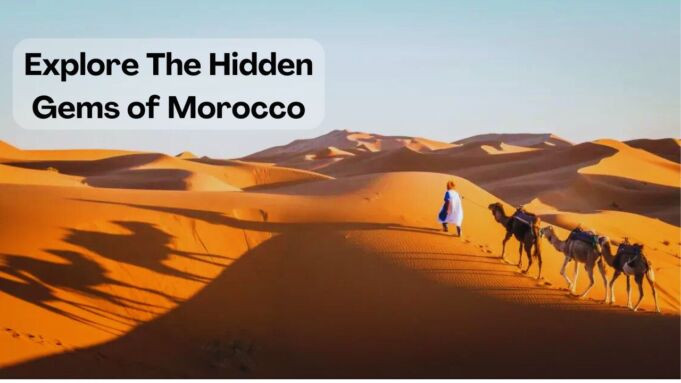Morocco, a country located in North Africa, is a land of diverse landscapes, rich history, and vibrant culture. From the bustling markets of Marrakech to the stunning Sahara Desert, Morocco offers a unique and captivating travel experience.
In this comprehensive tour guide, we will delve into the various aspects of planning a visit to Morocco, including the best attractions to visit, cultural experiences, cuisine, and practical tips for a memorable journey.
What is the Geographical Location of Morocco?
Located in North Africa, Morocco is bordered by Algeria to the east, the Western Sahara to the south, the Atlantic Ocean to the west, and the Mediterranean Sea to the north. Its diverse landscapes, from the Atlas Mountains to the Sahara Desert, make it a captivating destination for travelers seeking natural beauty.
The country’s rich history and vibrant culture further add to its allure, offering visitors a unique and immersive experience. Exploring the geographical location of Morocco provides insight into the varied terrain and environments that contribute to its diverse and captivating appeal for tourists.
What is the Climate Like in Morocco?
Morocco’s climate is as diverse as its landscapes, offering a range of weather patterns throughout the year. From the Mediterranean climate of the northern coast to the arid desert conditions of the Sahara, visitors can expect a wide array of temperatures and precipitation. Coastal areas experience mild, wet winters and hot, dry summers, while the interior regions can be characterized by extreme heat in the summer and cold in the winter.
The Atlas Mountains bring cooler temperatures and even snow in the winter months, providing a stark contrast to the desert regions. Understanding the climate variations in Morocco is essential for planning an enjoyable and comfortable visit.
3 Days Morocco Tour Itinerary
Embarking on a 3-day Marocco Tour (Marocco consigliati) offers a condensed yet exhilarating glimpse into the country’s rich tapestry of culture, landscapes, and historical wonders.
Day 1 begins in Marrakech, exploring the vibrant souks, the majestic Koutoubia Mosque, and the lively Jemaa el-Fnaa Square. Savor traditional Moroccan cuisine at a local riad to complete the experience.
On Day 2, journey to the Atlas Mountains, enjoying the scenic route to Ait Benhaddou, a UNESCO World Heritage site known for its iconic kasbahs and as a backdrop for many films. The day ends in Ouarzazate, the gateway to the Sahara Desert.
Day 3 ventures into the heart of the Sahara for a camel trek through the rolling dunes of Erg Chebbi, culminating in a magical night under the stars at a desert camp, offering an unforgettable finale to this Moroccan adventure.
10 Must-See Attractions in Morocco
Engaging with the local community through cultural experiences such as traditional music and dance performances, henna art, and tea ceremonies can offer valuable insights into Moroccan traditions and customs.
- Marrakech’s Jemaa el-Fnaa: This bustling square is a vibrant hub of activity, with street performers, food stalls, and traditional musicians creating an electrifying atmosphere.
- The Hassan II Mosque in Casablanca: This architectural marvel is one of the largest mosques in the world and a must-see for its intricate design and stunning seaside location.
- Chefchaouen: Known for its distinctive blue-hued buildings, this picturesque town nestled in the Rif Mountains offers a tranquil and photogenic escape.
- Sahara Desert: A visit to Morocco would be incomplete without experiencing the awe-inspiring beauty of the Sahara Desert, with options for camel treks and overnight camping under the stars.
- Fez Medina: This UNESCO World Heritage site is a labyrinth of narrow streets, bustling markets, and historic landmarks, offering a glimpse into Morocco’s medieval past.
- Ait Benhaddou: This ancient fortified village, with its well-preserved kasbahs, provides a captivating glimpse into Morocco’s historical architecture and heritage.
- Atlas Mountains: For outdoor enthusiasts, the Atlas Mountains offer opportunities for trekking, hiking, and breathtaking views of the rugged terrain.
- Essaouira: This coastal town is known for its charming seaside ambiance, vibrant art scene, and historical fortifications, making it a must-visit destination.
- Dades Gorges: The dramatic rock formations and winding gorges of Dades Valley offer a stunning backdrop for exploration and outdoor adventures.
- Volubilis: These ancient Roman ruins provide a fascinating insight into the historical legacy of Morocco, with well-preserved mosaics and architectural remnants that transport visitors to ancient times. Exploring these attractions offers a multifaceted understanding of Morocco’s allure, from its vibrant present to its rich past.
With a blend of natural wonders, cultural immersion, and historical marvels, Morocco presents an enthralling tapestry for travelers to unravel on their journey through this captivating North African gem.
Cultural Experiences in Morocco
Travelers can immerse themselves in the local culture by visiting traditional Berber villages, partaking in a traditional tea ceremony, and witnessing the art of Moroccan craftsmanship, such as pottery and carpet weaving. Additionally, attending a traditional Moroccan music and dance performance, known as a “Gnawa” ceremony, offers a unique cultural experience.
Delightful Moroccan Cuisine
Moroccan cuisine is renowned for its flavorful tagines, couscous dishes, and a variety of pastries and desserts such as pastilla and baklava. The use of aromatic spices such as cumin, saffron, and cinnamon adds depth and richness to the cuisine, making it a delight for food enthusiasts.
Practical Tips for Traveling in Morocco
Travelers need to be mindful of local customs and dress modestly, especially when visiting religious sites. Additionally, bargaining is a common practice in the souks, so it is advisable to hone your negotiation skills. It is also recommended to carry cash, as credit cards may not be widely accepted in smaller establishments.
- Respect local customs and dress modestly.
- Carry a scarf or shawl to cover your head when visiting religious sites.
- Stay hydrated and use sunscreen, especially in the desert areas.
- Bargain when shopping in the souks but do so respectfully.
- Be cautious of pickpockets and keep your belongings secure.
- Learn a few basic phrases in Arabic or French to communicate with locals.
- Follow the advice of your tour guide or locals when exploring less touristy areas.
- Be open-minded and embrace the cultural differences you encounter.
Is Morocco Cheap to Travel?
Traveling to Morocco can be quite affordable, especially when compared to many Western countries. The cost of travel in Morocco can vary widely depending on your travel style, the types of accommodation you choose, where you eat, and how you get around. Budget travelers can find good deals on accommodations and food, with inexpensive options available for hostels, local guesthouses (riads), street food, and local restaurants. Public transportation, like buses and trains, is reasonably priced, making intercity travel accessible.
However, if you prefer luxury accommodations, fine dining, or private tours, the costs can increase significantly. Activities such as guided tours, Sahara desert treks, and entry fees to major tourist attractions will add to your expenses. Shopping in the souks can also vary in cost, depending on your bargaining skills and the items you wish to purchase.
Conclusion
Embarking on a tour of Morocco promises an unforgettable journey filled with diverse experiences, from exploring ancient cities to marveling at breathtaking landscapes. By immersing themselves in the rich culture, savoring the delectable cuisine, and embracing the unique traditions of Morocco, travelers can create lasting memories and gain a deeper appreciation for this enchanting destination. With careful planning and an open mind, a trip to Morocco is sure to leave a lasting impression.















